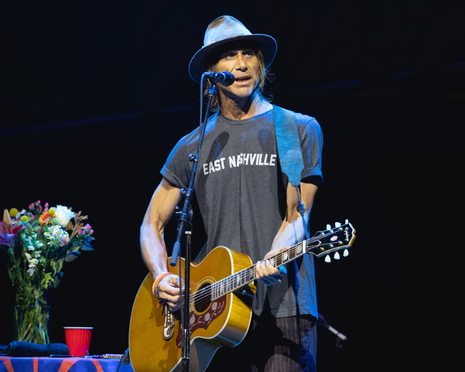
American Singer-Songwriter, Folk-Rock Storyteller, and Alt-Country Icon
Todd Snider was an American singer-songwriter whose work blended folk, rock, blues, alt-country, and funk into a uniquely vibrant and restless form of Americana. A natural-born storyteller with a conversational singing style, Snider wrote songs that were humorous, political, heartfelt, and deeply human.
Snider died on November 14, 2025, at age 59, leaving behind a rich legacy of albums, poems, stories, and the unwavering loyalty of a vast community of fans and fellow musicians.
Early Life and Formative Years
Todd Snider was born Todd Daniel Snider on October 11, 1966, in Portland, Oregon. Although he moved around during childhood and adolescence, the Pacific Northwest remained a part of his personal mythos, and he frequently referenced his early life in stories and interviews. Snider described himself as a restless kid who never quite settled comfortably into traditional structures. Music became one of the few places where he felt truly at home.
As a teenager, Snider found escape in the records of songwriters—artists who told stories, joked, philosophized, and turned the simplest observations into art. The sounds of folk revivalists, country poets, blues musicians, and 1970s rock singers shaped his musical vocabulary. Before long, Snider realized he felt most alive when he was writing, daydreaming, or watching live performers.
He spent time drifting through California and Texas, eventually landing in the Nashville area in the late 1980s. Nashville, with its songwriting culture and rambunctious nightlife, suited him immediately. He began performing in small clubs, writing relentlessly, and absorbing the wisdom of the city’s elder songwriters.
It wasn’t long before the industry took notice.
Career Beginnings and Breakthrough
Todd Snider’s debut album, Songs for the Daily Planet (1994), announced the arrival of a distinctive new voice. The record featured “Talkin’ Seattle Grunge Rock Blues,” a satirical takedown of music-industry trends that became a surprise hit. Its success introduced Snider to a national audience, but it was only a glimpse of the breadth of his talent.
He followed with Step Right Up (1996) and Viva Satellite (1998), continuing to sharpen his presence as a witty, lyrically sharp, sometimes mischievous songwriter unafraid to lampoon cultural absurdities or reveal his vulnerabilities. Snider’s charm lay in how authentic he sounded; nothing about his art felt forced or scripted.
Even early in his career, his live performances hinted that Snider might ultimately be remembered as much for his stage persona as for his studio output. His concerts often included long, wandering, hilarious monologues between songs—“Todd stories,” as fans came to call them. These anecdotes were part stand-up comedy, part poetry reading, part confessional.
A New Chapter: Nashville, Mentorship, and Critical Acclaim
During the 2000s, Todd Snider’s career evolved in new directions. He formed close bonds with some of Nashville’s legendary songwriters, including John Prine, Guy Clark, Kris Kristofferson, and Jerry Jeff Walker. These artists—many of whom saw in Snider a younger version of themselves—encouraged him, collaborated with him, and helped shape the next phase of his career.
Snider signed with Prine’s indie label, a move that brought new creative freedom. During this period, he recorded some of his most celebrated albums, including New Connection and the live collection Near Truths and Hotel Rooms. But it was 2004’s East Nashville Skyline that became a turning point. The record blended humor, heartbreak, social commentary, and dazzling storytelling in a way that immediately earned cult-classic status. Fans and critics still cite it as one of his finest works.
Songs from this era—like “I Can’t Complain,” “Beer Run,” and “Alright Guy”—became unofficial anthems of the Americana scene. Todd Snider had found his lane, and he was driving it with total confidence.
Themes & Style: Humor, Humanity, and Hard Truths
Todd Snider’s songwriting defied easy categorization. He could write political songs without preaching, funny songs without triviality, and sad songs without melodrama. His lyrics were simple on the surface but deceptively sharp, packed with insight and a kind of weathered optimism.
1. Humor & Satire
Snider had a comedian’s timing and a novelist’s sense of irony. His songs often included punchlines, clever twists, and deadpan social analysis. Yet the humor never felt mean-spirited; it came from compassion for the ordinary people he sang about.
2. Social & Political Commentary
While he never aligned himself strictly with political movements, Snider wrote frequently about class struggle, injustice, corruption, and the lives of those on society’s margins. Albums like Agnostic Hymns & Stoner Fables showed him at his most biting and incisive.
3. Vulnerability & Self-Reflection
Snider openly discussed his own struggles with addiction, depression, pain, heartbreak, and uncertainty. His willingness to tell the truth—especially about himself—helped build a deep, almost familial bond with fans.
4. Genre-Blending Musicianship
In later years, Snider experimented with funk, groove-oriented music, and raw acoustic blues. His 2021 album, First Agnostic Church of Hope and Wonder, displayed this evolution, featuring Snider playing most instruments himself.
Hard Working Americans and Collaboration
Todd Snider also explored collaborative work, most notably through the band Hard Working Americans, a supergroup blending jam-band sensibilities with his songwriting. This project allowed Snider to stretch in new creative directions. He contributed vocals and writing while allowing himself to lean into rock-and-roll energy.
The band released several albums and toured widely, attracting fans from outside Snider’s usual folk and Americana circles.
Writing Beyond Music
In addition to songwriting, Todd Snider also wrote prose. His storytelling abilities translated effortlessly to the page, and he published essays, reflections, and a book that captured the same charm and depth of his stage stories. His prose voice was equal parts philosophical, rambling, poetic, and self-aware.
Struggles, Health Issues, and Resilience
Throughout his career, Todd Snider battled a number of health issues, including chronic pain caused by spinal stenosis. These physical challenges affected his touring schedule and daily life, but he continued to write and perform whenever he could.
Despite hardships, Snider maintained an aura of creative resilience. His habit of writing every day—even during periods of pain or emotional difficulty—became a core part of his identity. Friends and collaborators often noted that Snider seemed to think in songs.
The Final Year: Turmoil and Tragedy
The final year of Todd Snider’s life was marked by intense physical and emotional strain. While touring in November 2025, he was violently assaulted outside a hotel in Salt Lake City. The attack left him seriously injured, and in the chaotic aftermath he was arrested following a series of conflicts and misunderstandings at a hospital.
Snider’s condition worsened after the incident. Once he returned home, he began experiencing difficulty breathing. He was later hospitalized with pneumonia, and despite medical care, his health declined rapidly.
Todd Snider died on November 14, 2025, in Nashville, Tennessee, at the age of 59.

Legacy: A Folk Hero for the Modern Era
Todd Snider occupies a unique place in American music history. His legacy is broad and multifaceted:
1. A Master Storyteller
Few songwriters could weave humor, tragedy, politics, and philosophy as gracefully as Snider. He had the rare ability to make listeners laugh and cry—sometimes in the same verse.
2. A Musician’s Musician
Snider was adored by fellow artists. His mentorship, especially toward emerging songwriters, helped shape the next generation of Americana musicians.
3. Champion of the Underdog
His songs often centered on misfits, dreamers, laborers, wanderers, and those on society’s fringes. He gave voice to the overlooked.
4. A Live Performer Without Equal
Snider’s concerts were legendary. Fans didn’t just attend a show—they attended an experience, one filled with storytelling, improvisation, humor, and catharsis.
5. A Bridge Between Traditions
He linked the classic songwriting traditions of the 1960s and 1970s to modern Americana, blending genres in ways that influenced countless artists.
6. A Prolific and Restless Creator
Snider was a writer before anything else. His catalog—spanning dozens of albums, live recordings, and written pieces—reflects a life dedicated to chasing the perfect story.
Conclusion
Todd Snider lived the life of a true troubadour: restless, poetic, defiant, compassionate, and endlessly creative. His songs captured the essence of ordinary people and extraordinary experiences. His humor softened life’s blows; his honesty illuminated its beauty and sorrow.
Although his life ended tragically and far too soon, his work continues to resonate. His music remains a comfort to the troubled, a guide to the lost, and a reminder that art thrives in honesty—even messy, complicated honesty.
Todd Snider once said in an interview that he wrote songs because he wanted people to feel less alone. In that mission, he succeeded completely.
His voice endures. His stories live on. And the community he built—one song at a time—continues to grow.
Check out Todd Snider on Amazon by clicking here.
If you found this interesting please share it with your friends and family, and check out some of our other articles on Musicians who Died in 2025.
.

